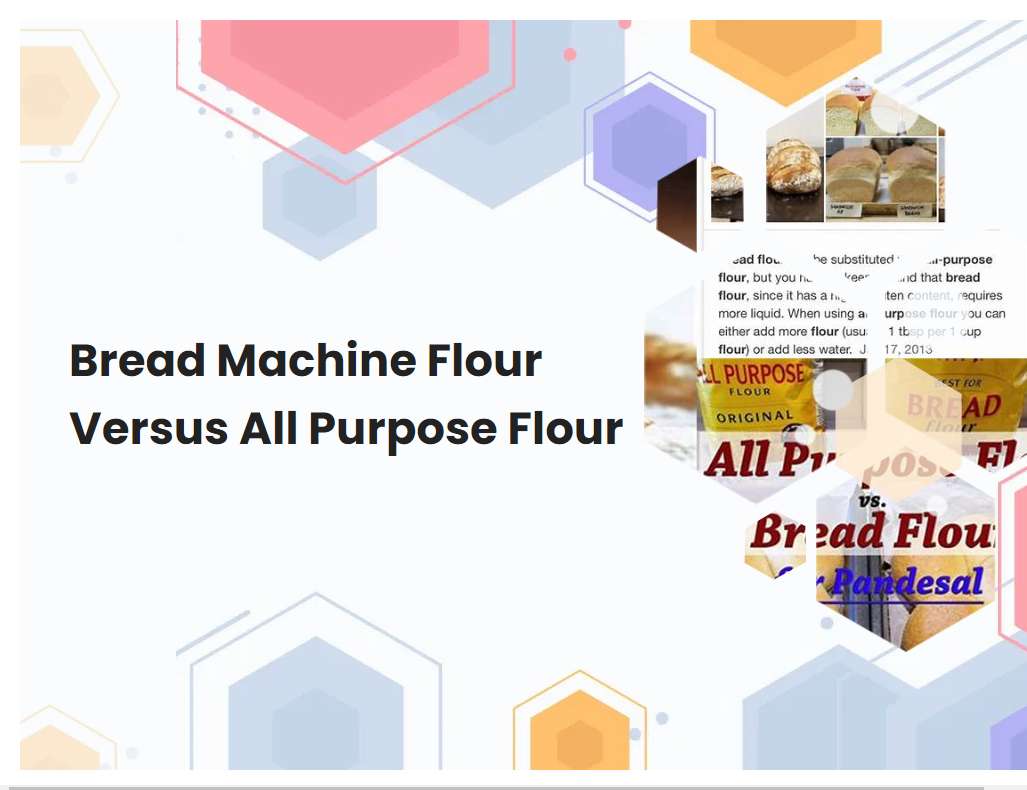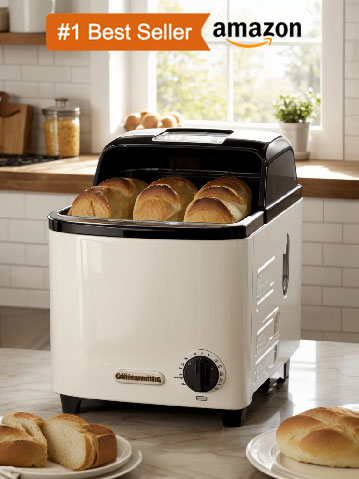Bread Machine Flour Versus All Purpose Flour
Making bread is a popular activity that has been around for centuries. It is a time-honored tradition that can bring families together, while providing delicious homemade bread. The type of flour used in bread making plays an important role in the outcome of the final product. Bread machine flour and all-purpose flour are two common types used in bread making, but they have distinct differences.

Bread machine flour is specifically formulated for use in bread machines, whereas all-purpose flour is a blend of different types of wheat flour.
Bread machine flour is a type of flour that is specifically designed for use in bread machines. It has a higher protein content than all-purpose flour, which helps the dough to rise better and gives the bread a better texture. The higher protein content also helps the gluten to form more easily, which helps the dough to hold its shape during the kneading process.
In addition to the higher protein content, bread machine flour also contains additives such as dough conditioners, emulsifiers, and enzymes that help to keep the dough from becoming too stiff or dense during the baking process. All-purpose flour, on the other hand, is a blend of different types of wheat flours and is not specifically designed for use in bread machines. It can be used in bread recipes if desired, but it may not produce the same quality of bread as bread machine flour can.
Bread machine flour contains a higher ratio of protein than all-purpose flour, which helps the dough rise better and produce a better texture.
Bread machine flour is a special type of flour specifically designed for use in bread machines. It is higher in protein than all-purpose flour, making it better suited for bread baking. This extra protein helps the dough rise better and produce a more consistent texture.
When used in a bread machine, the flour helps create an even and fluffy texture throughout the entire loaf. The protein content also helps the dough hold in moisture, resulting in a softer and more flavorful bread. Additionally, bread machine flour can be used to make other types of doughs such as pizza and pasta, with excellent results.
See also: Can I Use Self Raising Flour In A Bread Machine
All-purpose flour is better for making pastries, as it creates a lighter texture.
All-purpose flour is a great choice for making pastries because it creates a light and fluffy texture. It's made from a blend of hard and soft wheat, which gives it a balanced protein content that helps create a tender, yet slightly chewy texture. All-purpose flour is also very versatile and can be used in a variety of recipes, including cakes, cookies, muffins, and other baked goods.
The protein content of all-purpose flour helps create structure in the dough, which prevents the pastry from becoming too dense or heavy. Additionally, the gluten in all-purpose flour helps bind ingredients together, creating a cohesive mixture that is easy to work with. To ensure that your pastries turn out light and fluffy, be sure to use all-purpose flour when baking.
See also: How To Make Pretzel Dough In A Bread Machine
Bread machine flour is usually more expensive than all-purpose flour.
Bread machine flour is specifically designed for use in bread machines, as its name implies. This type of flour is different from regular all-purpose flour in that it has a higher protein content. The higher protein content helps the dough to rise, which is important when baking bread in a machine.
Bread machine flour also has a finer texture, which helps create a lighter texture in the finished product. In addition, the flour is usually enriched with vitamins and minerals, making it nutritionally superior to regular all-purpose flour. Because of its special characteristics, bread machine flour is usually more expensive than all-purpose flour. However, the extra cost is worth it if you are looking for a light and fluffy loaf of bread.
See also: How Do You Cut Bread Machine Bread
All-purpose flour can be used as a substitute for bread machine flour, but the texture of the bread may not be as good.
All-purpose flour can be used as a substitute for bread machine flour, but it is important to note that the texture of the bread may not be as good as if you had used bread machine flour. All-purpose flour does not contain as much gluten as bread machine flour does, which means that it will not rise as well or create the same texture in the finished product. Additionally, bread machine flour has additives like malted barley flour and dough conditioners, which are not present in all-purpose flour.
The lack of these additives can lead to a more dense and heavy texture in the final loaf of bread. Therefore, while all-purpose flour can be used as a substitute for bread machine flour, it is important to remember that the texture may be compromised.
See also: White Bread With Powdered Milk Bread Machine
Bread machine flour should not be used for making cakes, as it will not provide the same light texture as all-purpose flour.
Bread machine flour is specifically designed to help bread dough rise better in a bread machine. It has a much higher protein content than all-purpose flour and is a blend of hard and soft wheat flours. This combination makes it ideal for breads, but not for cakes.
If you use bread machine flour for cakes, you'll end up with a dense, dry texture that won't give you the same fluffy, light crumb as cakes made with all-purpose flour. All-purpose flour is a blend of both hard and soft wheat flours, but it has lower protein content than bread machine flour, making it the ideal choice for cakes. All-purpose flour helps create a light and airy texture with just the right amount of tenderness for the perfect cake.
See also: Why Didnt My Welbilt Bread Machine Mix
Bread machine flour is usually made from a combination of hard and soft wheat flours, which helps produce a better texture for breads.
Bread machine flour is a special type of flour designed specifically for use in bread machines. It is made from a combination of both hard and soft wheat flours, which helps to ensure that the breads that are baked in a bread machine have the ideal texture. The hard wheat flours give the dough structure and strength, while the soft wheat flours provide the necessary moisture and flexibility for the dough to rise.
This combination of flours creates a dough that is strong enough to hold its shape and texture during baking, yet still light and fluffy when cooked. Additionally, the combination of flours helps to provide a better texture for the finished product. Bread machine flour is available in both all-purpose and bread flour varieties, so it can be used for a variety of recipes.
Bread machine flour should not be used to make pizza dough, as it won't provide the same chewy texture as all-purpose flour.
Bread machine flour is not the best choice for making pizza dough due to its lack of the chewy texture found in all-purpose flour. Bread machine flour, which is a low-protein flour designed to work in bread machines, will not give the same results as all-purpose flour when making pizza dough. All-purpose flour is a combination of hard and soft wheat flours, and it contains more gluten than bread machine flour.
Gluten is what gives pizza dough its chewy texture and elasticity. In addition, the higher protein content in all-purpose flour helps to create a crisp, golden crust. For these reasons, it is best to use all-purpose flour when making homemade pizza dough.
Bread machine flour is pre-sifted and contains more gluten than all-purpose flour, so it will create a denser loaf of bread.
Bread machine flour is specifically designed for use in bread machines, as it contains more gluten than all-purpose flour. This gives the dough more strength and elasticity, so the dough will rise better, creating a lighter dough and a higher, fluffier loaf of bread. Additionally, bread machine flour is pre-sifted, making it finer and easier to mix, resulting in fewer lumps in the dough.
It also helps the dough to rise evenly, giving a consistent shape and texture to the finished loaf. This makes it a great choice for those who want consistent results with their bread machine. Bread machine flour is also great for those who prefer a denser loaf of bread, as the extra gluten gives it more structure and density.
All-purpose flour can be used in most recipes that call for bread machine flour, but the results may not be as good as using the correct type of flour.
All-purpose flour can be used as a substitute for bread machine flour in some recipes, but it is important to understand that the results may not be as good as using the correct type of flour. All-purpose flour is a blend of hard and soft wheat flours and is designed to work well in many different types of recipes, but it lacks the higher protein content of bread machine flour which is necessary for producing a light and fluffy loaf of bread. Furthermore, all-purpose flour may contain gluten which can affect the texture and taste of the finished product. It is always best to use the type of flour that the recipe calls for in order to get the best results.





